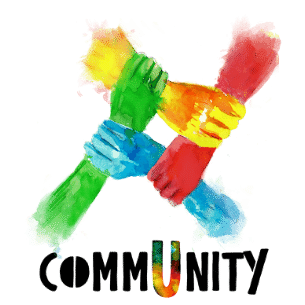Working through COVID-19
The influence of the COVID-19 pandemic on the impact of the CommUnity Project
The COVID-19 pandemic, the consequent national and local restrictions, and the multiple waves and lockdowns throughout the global health crisis had an undeniable impact on the organisation and implementation of CommUnity Project activities. Barely four months after the start of the CommUnity Project, the devastating effects of the coronavirus reached Europe and started to wreak havoc on the health, economy, and daily lives of people worldwide. Naturally, this impacted the timeline, the format, and the approach of the CommUnity Project. Not only did many project activities need to be postponed, many project activities had to be modified, rethought, and/or reorganised in the online space. In a project focused on community building, these delays had significant consequences on the impact and scope of the project, affecting its effectiveness and efficiency. However, as written below, despite the challenges posed by the COVID-19 pandemic and related health restrictions on the effectiveness, efficiency, and impact of the CommUnity Project, the flexible nature of the Design Thinking Methodology adopted by the CommUnity Project brought innovation and creativity within the Consortium.
COVID-19 and the Design Thinking Method
Thanks to the iterative approach of the Design Thinking Method and its continued improvement through the Empathize-Define-Ideate-Prototype-Test cycle, it has proven to be the perfect way to deal with, strategize and successfully manage the CommUnity Project in all its development, organization, and implementation. Despite the obvious challenges, the flexible nature of the Design Thinking approach to adapt, postpone, and modify all project-related activities ensured the effectiveness, efficiency, and impact of the CommUnity Project.
Main challenges
The most common challenges faced by the CommUnity Project partners in the development, organization and implementation of the project activities consisted of the transition from an offline to an online setting, the difficulty of reaching participants and thus risking a limited effectiveness and impact of the CommUnity Project.
Since the start of the CommUnity Project coincided with the outbreak of the COVID-19 pandemic, followed by various lockdowns and national and local health restrictions that greatly impacted public life, gatherings, and unrestrained movement, most project activities were organized online during the first year. The partner organizations were urged to quickly adapt and modify their activities to an online program and become familiar with online tools such as Zoom, Teams, Mentimeter, Padlet, Jamboard, and Netflix Party.
Additionally, most partners had to develop and strengthen their online dissemination skills and increase their social media presence to engage and involve the target audience in their project activities. At first, this was incredibly challenging, resulting in a lack of participants, but with time passing, and lots of patience, new skills and dedication, more and more young people found their way to different CommUnity platforms and activities.
It is valid to assess how much the COVID-19 pandemic has influenced the effectiveness and impact of the CommUnity Project. Although it is impossible to know what impact the CommUnity Project would have had in a non-COVID-19 scenario, it should be mentioned that the CommUnity Project achieved its general and specific objectives.
COVID-19 as a creativity enhancer
Besides the difficulties posed by the COVID-19 to the world, including the CommUnity Project, it also encouraged the CommUnity Project Consortium to become more innovative and creative in finding appropriate solutions to conduct the project activities safely, while also ensuring real engagement and interaction with and among the target audience. This led to many surprising solutions and exciting events. For example, the Madrid-based JOIRE orchestra started to rehearse in empty shopping malls and churches to maintain a safe distance and liven up the spaces. Fedactio started city tours with youth across Belgium instead of the Peace Café events, and IDP created an online book community co-created and co-moderated by young literary experts from across Europe.
